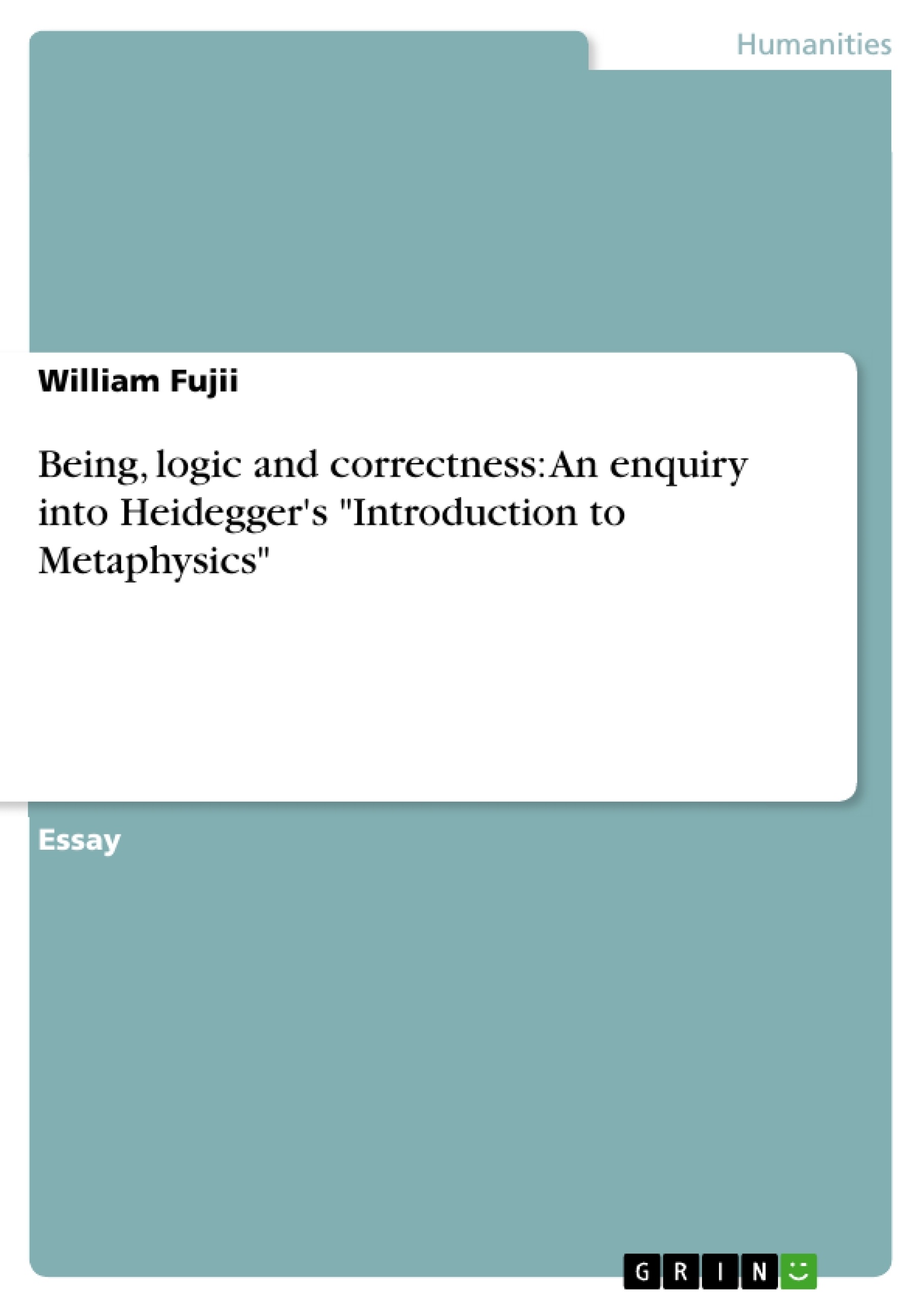Excerpt
Being, logic and correctness: An enquiry into Heidegger’s Introduction to Metaphysics
Martin Heidegger is widely considered one of the most controversial and influential philosophers of the twentieth century, his influence extending to the works of several philosophers, as well as in important philosophical schools such as existentialism and phenomenology. At the same time, his philosophy is also regarded as notoriously difficult, highly idiosyncratic and often even obscure. It is considered that there are several ways of reading Heidegger, which, in turn, is due to the existence of several ‘Heideggers’, the major distinction being the one that happened with die Kehre, or, ‘the turn’. This turn, which began in the 1930s, marks a departure from the earlier Heidegger and the beginning of a philosophical approach that separates his magnum opus, Being and Time (1927), from subsequent works.
Central to this turn is another of Heidegger’s major work, Introduction to Metaphysics, published in 1953 and originally delivered as a lecture course at the University of Freiburg in 1935. Here, Heidegger’s principal concern remains the question of Being, but he devotes greater attention to its history, carrying out exegesis of pre-Socratic philosophers in order to trace the origins of the concept of Being and consequently overcome the restriction that has been placed upon it. This paper shall present an outline of Heidegger’s account of the development of logic in the Introduction, for logic is a crucial element of Heidegger’s project in this book. Once this is done, it shall proceed to discuss the problems such development of logic has for the concepts of correctness in Heidegger’s view, ultimately linking the development of logic and problems for orthotes to the very restriction of Being.
The development of logic
Before we begin to outline Heidegger’s account of the development of logic, perhaps it would help to clarify in what context and why the origin of logic is traced in the Introduction of Metaphysics. In chapter four, Heidegger undertakes to elucidate four aspects against which Being is delimitated – what he calls Being and the Other – which, according to him, are: seeming, becoming, thinking and the ought. Out of the four, Heidegger holds that thinking is by far the most important because it represents the other three divisions to itself, as well as standing against Being much like an object – Gegen-stand - that which stands against.
To Heidegger, thinking is fundamental to understanding the meaning of Being because the two used to be one before they came to stand against each other, hence understanding thinking would consequently lead one closer to understanding the original meaning of Being. This means an investigation into the concept of thinking becomes essential. It is here that logic comes in, for logic is crucial to thinking as the two have come to be considered the same one with the other. As Heidegger puts it: ‘It [logic] is the science of thinking, the doctrine of the rules of thinking and the forms of what is thought’[1]. Thus, in order to investigate the split which Being and thinking have undergone, Heidegger endeavours to recover the original meaning of logic that, in its originality, was independent from the faculty of thinking.
According to Heidegger, logic first appeared as episteme logike, or, logos, which originally meant gathering rather than word or discourse, its present-day meaning. In line with this argument, he holds that the ancient Greeks did not necessarily understand logos as post-Greek philosophy understood it. To illustrate this, he uses a passage from Odyssey, where Homer uses logos as gathering, and a sentence from Aristotle’s Physics in which he speaks of logos as ‘bringing together’: taxis de pasa logos ‘but every order has the character of bringing together’[2]. Therefore logo s in its most original form means ‘to gather’, ‘gathering’, ‘bringing together’ in the same way as in ‘gleaning, collecting wood, harvesting grapes, making a selection…this means laying one thing next to another, bringing them together as one’[3]. Aristotle appropriated the usage of logos from the pre-Socratic philosopher Heraclitus, who played a significant role in the original development of logos. But a misinterpretation of him led to the beginning of the distortion of logos, a distortion that persists to this day and has led it to be regarded as identical to thinking, which has contributed to the limitation of the concept of Being.
The first step in this limitation, or decline, as Heidegger calls it, is marked by Plato and Aristotle’s transformation of phusis – the emerging abiding sway that was part of Being at the inception of Greek philosophy. While the pre-Socratics understood phusis as Being, Platonic philosophy reduced it to the faculty of thinking – the so-called Platonic idea –, that is, to one of the modes of Being[4] rather than Being in its totality. Subsequently logos, which to the pre-Socratics was a designation of Being the same way as phusis was, also suffers a transformation as the latter is reduced to idea.
[...]
[1] Heidegger 2001, pp91
[2] Aristotle, cited in Heidegger 2001, pp93
[3] Heidegger 2001, pp95
[4] Dahlstrom 2001, pp96
- Quote paper
- William Fujii (Author), 2008, Being, logic and correctness: An enquiry into Heidegger's "Introduction to Metaphysics", Munich, GRIN Verlag, https://www.grin.com/document/203251
Publish now - it's free






















Comments